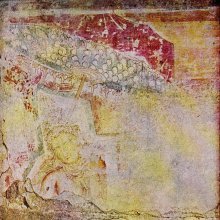Rajasimha, Rājasiṃha, Rajan-simha: 10 definitions
Introduction:
Rajasimha means something in Hinduism, Sanskrit, Jainism, Prakrit, the history of ancient India. If you want to know the exact meaning, history, etymology or English translation of this term then check out the descriptions on this page. Add your comment or reference to a book if you want to contribute to this summary article.
Images (photo gallery)
In Hinduism
Purana and Itihasa (epic history)
Source: Cologne Digital Sanskrit Dictionaries: The Purana IndexRājasiṃha (राजसिंह).—A king of Vidarbha. His daughter was married to Malayadhvaja Pāṇḍya.*
- * Bhāgavata-purāṇa IV. 28. 28-29.

The Purana (पुराण, purāṇas) refers to Sanskrit literature preserving ancient India’s vast cultural history, including historical legends, religious ceremonies, various arts and sciences. The eighteen mahapuranas total over 400,000 shlokas (metrical couplets) and date to at least several centuries BCE.
In Jainism
General definition (in Jainism)
Source: archive.org: TrisastisalakapurusacaritraRājasiṃha (राजसिंह) is the name of an ancient king from Haripura and previous incarnation of Niśumbha, according to chapter 4.5 [dharmanātha-caritra] of Hemacandra’s 11th century Triṣaṣṭiśalākāpuruṣacaritra: an ancient Sanskrit epic poem narrating the history and legends of sixty-three illustrious persons in Jainism.
Accordingly:—“King Rājasiṃha wandered for a long time in the ocean of births and became King Niśumbha in Haripura in Bharata. Black in color, forty-five bows tall, with a life of ten lacs of years, he came to have a cruel command on earth. After subduing the southern half of Bharatavarṣa with perfect ease, he became the fifth Ardhacakrin, the Prativiṣṇu”.

Jainism is an Indian religion of Dharma whose doctrine revolves around harmlessness (ahimsa) towards every living being. The two major branches (Digambara and Svetambara) of Jainism stimulate self-control (or, shramana, ‘self-reliance’) and spiritual development through a path of peace for the soul to progess to the ultimate goal.
India history and geography
Source: Shodhganga: The significance of the mūla-beras (history)Rājasiṃha is another name for Narasimhavarman II (AD 695–722): a king from the Pallava dynasty.—The great monuments at Mahabalipuram are a tribute to the eternal glory of Narasimhavarman I (AD 630-668). He was the son of Mahendravarman I (AD 600-630) and is known as Māmalla. Narasimhavarman II, also called Rajasimha, built the Kailasanatha Temple at Kanchipuram, a fine example of early Pallava masonry work. Nandivarman II (AD 730-795) was responsible for the other famous shrine Vaikuntaperumal Temple at Kanchipuram. Thus the high period of the Pallava style came between AD 600 and 800.

The history of India traces the identification of countries, villages, towns and other regions of India, as well as mythology, zoology, royal dynasties, rulers, tribes, local festivities and traditions and regional languages. Ancient India enjoyed religious freedom and encourages the path of Dharma, a concept common to Buddhism, Hinduism, and Jainism.
Languages of India and abroad
Sanskrit dictionary
Source: Cologne Digital Sanskrit Dictionaries: Shabda-Sagara Sanskrit-English DictionaryRājasiṃha (राजसिंह).—m.
(-haḥ) A great king. E. rāja, and siṃha a lion.
Source: Cologne Digital Sanskrit Dictionaries: Cappeller Sanskrit-English DictionaryRājasiṃha (राजसिंह).—[masculine] king-lion, an illustrious king.
Source: Cologne Digital Sanskrit Dictionaries: Aufrecht Catalogus CatalogorumRājasiṃha (राजसिंह) as mentioned in Aufrecht’s Catalogus Catalogorum:—king of Vikramapaṭṭana (Ujjayinī), son of Gajasiṃha, was patron of Kṛṣṇadhūrjaṭi (Siddhāntacandrodaya 1774). L. 851.
Source: Cologne Digital Sanskrit Dictionaries: Monier-Williams Sanskrit-English Dictionary1) Rājasiṃha (राजसिंह):—[=rāja-siṃha] [from rāja > rāj] m. ‘king-lion’, an illustrious king, [Mahābhārata; Rāmāyaṇa]
2) [v.s. ...] Name of various kings, [Inscriptions; Catalogue(s)]
Source: Cologne Digital Sanskrit Dictionaries: Yates Sanskrit-English DictionaryRājasiṃha (राजसिंह):—[rāja-siṃha] (haḥ) 1. m. A great king.
[Sanskrit to German]
Sanskrit, also spelled संस्कृतम् (saṃskṛtam), is an ancient language of India commonly seen as the grandmother of the Indo-European language family (even English!). Closely allied with Prakrit and Pali, Sanskrit is more exhaustive in both grammar and terms and has the most extensive collection of literature in the world, greatly surpassing its sister-languages Greek and Latin.
See also (Relevant definitions)
Partial matches: Rajan, Simha, Raja.
Starts with: Rajasimhapandya, Rajasimhasana, Rajasimhasudhasamgraha.
Ends with: Candrajasimha, Raghurajasimha, Vikramarajasimha.
Full-text: Rajasimhasudhasamgraha, Siddhantacandrodaya, Rajasimhapandya, Raghurajasimha, Sudhasamgraha, Mayadhanu, Krishnadhurjatidikshita, Kancipura, Simha, Vimaladharmasuriya, Viravikrama, Mamalla, Narasimhavarman, Vaikuntaperumal, Kailasanatha, Nandivarman, Haripura, Vikata, Apatha, Mahadeva.
Relevant text
Search found 15 books and stories containing Rajasimha, Rājasiṃha, Rajan-simha, Rājan-siṃha, Rāja-siṃha, Raja-simha; (plurals include: Rajasimhas, Rājasiṃhas, simhas, siṃhas). You can also click to the full overview containing English textual excerpts. Below are direct links for the most relevant articles:
The Religion and Philosophy of Tevaram (Thevaram) (by M. A. Dorai Rangaswamy)
Nayanar 65: Pusalar (Pucalar) < [Volume 4.1.1 - A comparative study of the Shaivite saints the Thiruthondathogai]
Chapter 7 - Age of Nampi (Sundarar)—Examined < [Volume 1 - Nampi Arurar’s Tevaram (his life and age)]
Introduction < [Volume 3.7 - Unto the last]
Vastu-shastra (5): Temple Architecture (by D. N. Shukla)
Pallava Phase (Circa 600 A.D. to 900) < [Chapter 12 - History of Hindu Temples (Prāsādas and Vimānas)]
Early Chola Temples (by S. R. Balasubrahmanyam)
Garbhagriha < [Chapter XIII - Prasada: Component Parts]
End of an Epoch < [Chapter XIV - Conclusion]
Temples in Tirukkodikkaval < [Chapter VIII - Temples of Uttama Chola’s Time]
Chaitanya Bhagavata (by Bhumipati Dāsa)
Verse 3.4.342 < [Chapter 4 - Descriptions of Śrī Acyutānanda’s Pastimes and the Worship of Śrī Mādhavendra]
Dasarupaka (critical study) (by Anuru Ranjan Mishra)
Part 14 - Other features of the Dūtavākya < [Chapter 5 - Vyāyoga (critical study)]
Part 12 - Society in the Ūrubhaṅga < [Chapter 8 - Utsṛṣṭikāṅka (critical study)]
Trishashti Shalaka Purusha Caritra (by Helen M. Johnson)
Part 8: Previous birth of Puruṣasiṃha < [Chapter V - Śrī Dharmanāthacaritra]
Part 9: Birth of the Prativāsudeva Niśumbha < [Chapter V - Śrī Dharmanāthacaritra]
